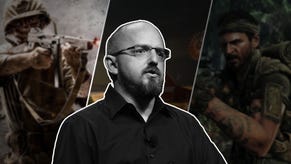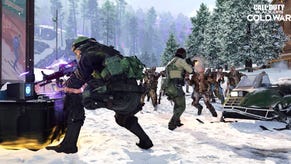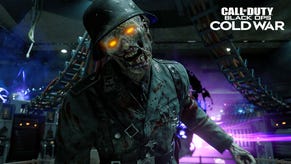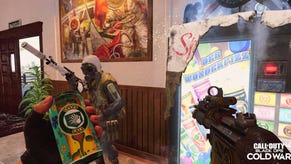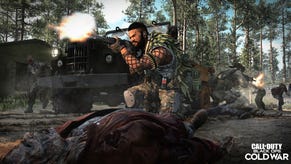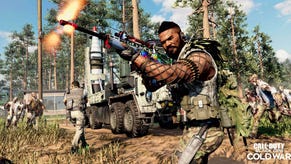Interview - Call of Duty: Black Ops' Mark Lamia speaks in LA
One of the biggest questions asked when the Cold War setting for Call of Duty: Black Ops was revealed was how developer Treyarch - freshly freed from the creative shackles of World War II games - would tackle the subject matter. Would Black Ops be a continuation of the guts and glory, flag-waving bombast of previous games in the series? Or would Treyarch be permitted to stretch itself and explore the heart of darkness behind two of the USA's most humbling Waterloos - the Vietnam conflict and the failed invasion of Cuba?
A quick look at the Call of Duty: Black Ops reveal trailer suggests it's business as usual - crossbows with explosive quarrels, helicopter gunships and pyrotechnics galore. Subtle it's not.
Treyarch's studio head Mark Lamia took some time out to talk about rewriting history, why dedicated servers aren't a big deal, and how the next Call of Duty will enable gamers to win battles despite losing the war.
The team also showed off the game in London this week, and we again spoke to Mark in the UK, this time with a ton of input of community manager Josh Olin. Get that here.
VG247: What's it like transitioning to a Cold War setting from the less morally ambiguous ground you've explored in the past?
Mark Lamia: Refreshing to be able to do something new. We made a lot of World War II games and we're really proud of that, but we really wanted to do something new. What was great about this era is it's new for Call of Duty, but it's pretty fertile grounds for gaming in general.
Not a lot has been done in this era in particular because it's not so much about what people know, it's about what they haven't experienced with the secret wars and covert ops and black operations and deniable operations and unconventional warfare. It's about the layer that's underneath what people read about in the textbooks.
Cuba and Vietnam are conflicts where the USA's performance wasn't exactly covered in glory. As someone who has a big US audience, how do you cover that territory without offending people?
Mark Lamia: The game and the story is about black operations, not about the Vietnam War. It takes place during the Vietnam War and in other hot spots throughout the Cold War, but it's about the operations that people haven't heard about, and the objectives, and what was really going on, in our story and our fiction at least.
I'm not revealing the plot of our story, but you'll have to play the game to find out whether they were successful or not. But it takes place over that course of time.
But isn't a bit hard to divorce the bigger picture? Which is...
Mark Lamia: How do you know what happened in Cuba? How do you know what happened in Vietnam? I talked to the Studies and Observations Group, which was a force that was made up of elite Green Berets, elite Air Force and elite Navy. When we talk to those veterans, their missions were only recently even spoken about or declassified. So, our story is not so much about what the media told people it was about, it's about what wasn't reported. That's what inspired our narrative, and that's why it's "Black Operations". Deniable conflicts. The kind of stuff that the governments had to deny, because if they didn't, these kind of operations could ignite a world war. And of course, at that time, the fear was mutually assured destruction.
Without giving away the plot and the story I want our players to enjoy, I want to get two things across: it's a game that takes places over the the course of this period, but it's about the wars and conflicts that people haven't heard about. It's about the black operations and it's about being a Black Ops soldier who is... these guys are the godfathers of tactical recon. These guys are the original badasses. These are the guys who were empowered on the battlefield to do what they needed to do to get the job done because no-one was coming in for them. It was like, they were given their mission, they went on their missions with what they needed, and their missions were classified. They just weren't told.
Is there a 'bad guy' in Black Ops? Or is it just "you're on one side, and they're on the other"?
Mark Lamia: We want to tell a great story. And so there'll be characters you're fighting against. I will tell you there is a Soviet general you're trying to track down that is doing some very bad things. Of course, you're on one side and they're on the other. Without giving way the storyline, it's not like "the superpowers are fighting against each other". That is going on in one layer. You have historical battles going on in another layer, the secret battles going on in another layer, and you have have character and story development. And in order to do proper character and story development, which is something we've taken very seriously with this game, yes, you have recogniseable and identifiable characters. Both on your side - who are the Black Ops forces - and of course, on the enemy side.
Is picking enemy combatants an area that takes a little bit of tiptoeing around as you get closer to modern times? For example, if you're fighting Russian militia in the game, you've got a large base of Russian players who are probably as proud of their hometown as somebody in America.
Mark Lamia: Then they'll love playing in our multiplayer. Here's the point: we met with Soviet Spetnaz. We met with Soviet black ops forces. They're fairly inspired as well about what they did. They inspired some of our gameplay and some of our gameplay types, and actually will be portrayed in some of the levels. Sonny Puzikas, who is a former Soviet Spetnaz and authority on it, came and visited our studio. He spent time with our animators, and we changed up gameplay based on things that he showed us. He told us about how they trained, the kind of things that they did. You cannot help but be inspired when you're around those kind of people.
While our single-player narrative is you playing from the side of the US and the CIA, and it's that versus the then Soviet Union, we're going to allow people in multiplayer to play all the different kinds of black ops forces.
Do you think American gamers could love a game where they didn't play "the good guys" - especially a FPS which has a historic basis?
Mark Lamia: Let's just say I think what's so interesting about this time [Cold War] was its ambiguity. That's one of the things that marks this time. But this is a Call of Duty game, and you are going to play the hero. We're going to make sure that when you complete your mission. It's an accomplishment, and you're badass, and you're fighting for something heroic.
Do I think people could play something other than the US? Yeah. We've done that in the past - we've played as British, Canadians in our games - we've played as other people in Call of Duty games. And like I said, in multiplayer we let you play as other sides.
How do you balance that acknowledged ambiguity of that era with the bombastic Call of Duty gameplay we've seen, where the focus is on hyper-adrenalised action?
Mark Lamia: We're not intending to create a history lesson for anybody. We do actually do our research. Like I said, we meet with veterans, we research the eras, we do tons of writing. We do all that to create a believable setting. But we create a fictional account.
It's a good, interesting question. Whether you're talking about World War II or this era, whenever you touch upon history and war games, you're touching upon things that were inspired by real events. When I've talked to veterans, I let them know we want to draw inspiration from them but we're creating an entertainment product. They understand that, the same as they understand it with movies and books.
What I hear a lot of times is that they're interested in it because it creates a current connection for people. Not so much that we're telling a historical account, but that people sometimes get inspired by the era, or what's gone on, or these battles, or whatever it is that we're fictionally portraying. They find that people want to learn more about it afterwards. And in a way, they really like that. I've heard that on more than one occasion. It's an interesting question, but again, we're not trying to create a history lesson for anybody. We're trying to create an action experience and it is a fictional account. And we do create our own fiction and get very creative with it.
With Infinity Ward being in its current state, is there more or less pressure on Treyarch to deliver a definitive product this year?
Mark Lamia: What I can say is we put so much pressure on ourselves to create a great Call of Duty game every single time we create one. When you're performing at this level and you're placing these expectations on yourself, it's sort of like it's not even possible to feel more pressure that the pressure we're already putting on ourselves.
We're making the next Call of Duty game and we want to make it huge. We want it to be the best experience that anyone's ever had. That's our goal. When somebody wants to throw something else in the mix, it's like "we're already there". We're already operating at that level.
Have you seen increased interest from PC gamers in Treyarch's Call of Duty plans as a result of Infinity Ward's decision to not offer dedicated servers for Modern Warfare 2?
Mark Lamia: We do listen to the community. I think it's really important to distinguish that we make [our] games, and Infinity Ward and other people make their games. They're not connected. They're not associated.
On [Call of Duty] World at War, we had dedicated servers. On World at War, for console players you could sort by locale, you had a locale filter. That just carried forward for us in terms of what we wanted to do. As far as whether people look to us because of other things? You know, maybe you can tell me.
I can tell you that people have very vocally expressed that they would like to see dedicated servers [in Black Ops] and now I'm glad we can actually talk about it because hey, we were never actually not doing them. That's something we were carrying forward from our prior game.
Is that frustrating? Having to re-confirm and re-clarify features that were standard in your games in the past?
Mark Lamia: I think the frustrating part is when we're not ready to reveal, but everyone wants to know what's going on. I don't think I've ever read more stories about a game before it was revealed than this game, starting from almost like a year ago it seems.
I'm just happy that we can finally talk about it and you can see it and people can see the trailer. People can see what we're doing and they can form their own opinions on it. We're really proud of our work and we hope people like that they see.



